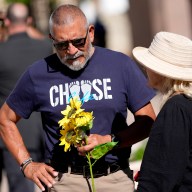TURIN, Italy – Patrick Chan’s wide smile was back, and so was the wonderfully familiar sense of lightness in his skating that had abandoned him so abruptly in Vancouver.
With the weight of the pressure of the Olympics off his shoulders, the Canadian finds himself in the hunt for his second consecutive medal at the world figure skating championships, finishing second in the short program Wednesday with the best skate of his season.
“I kind of got into that zone and got into that flow of just enjoying myself and being in the moment and taking each element at a time and taking my time doing each one,” Chan said. “I think Vancouver just helps you on all levels of confidence and elements and everything. It was finally good to be at worlds and really enjoy it instead of being nervous about everything that surrounds it.
“I felt great on the warmup and really was relaxed off the ice, and wasn’t nervous, and then I went out and it all went by really fast so I think that’s a good sign.”
The 19-year-old from Toronto scored 87.80 points for his performance to “Tango de los Exilodos,” more than six points higher than he scored a month ago in Vancouver, where he bobbled his triple Axel, stumbled on his step sequence and then stepped off the ice at a jam-packed Pacific Coliseum with a look of utter bewilderment. Chan went on to finish fifth in his Olympic debut.
In a half-empty Palavela arena Wednesday – the site of the 2006 Olympics – Chan was the picture of composure, nailing all his jumps and executing his spins and step sequences with poise and precision.
Coach and choreographer Lori Nichol told the skater before he stepped onto the ice: “Just enjoy the moment, and breathe.”
“Think about breathing and taking my time through each element, and not racing through it like a puppy, which I’m known to do,” Chan said. “It was great, at the end she said you did exactly what I wanted you to do, you took your time through each element and enjoyed performing it.”
Daisuke Takahashi of Japan, the Olympic bronze medallist, scored 89.30 points to take the lead heading into Thursday’s long program in a field that’s missing both the Olympic gold and silver medallists.
Brian Joubert of France, who landed one of just two quad jumps among the top-10 skaters, scored 87.70 to sit third.
Kevin Reynolds of Coquitlam, B.C., who also landed a quad – one of just four in the field of 46 skaters to do so – is 14th.
Canadian teammates Jessica Dube and Bryce Davison finished sixth in the pairs. Dube, from St-Cyrille-de-Wendover, Que., and Davison, from Huntsville, Ont., had been eighth after the short program but moved up with their long program to “The Way We Were” to finish with 177.07 points.
“Obviously it wasn’t perfect again,” said Dube. “But it was the best performance we’ve done interationally, and it just feels good to finish the season on that note.”
Olympic silver medallists Pang Qing and Tong Jian of China won the gold with 211.39 points, while Germany’s Aliona Savchenko and Robin Szolkowy, third in Vancouver, won silver with 204.74. Russians Yuko Kavaguti and Alexander Smirnov took the bronze with 203.79.
Anabelle Langlois of Hull, Que., and Cody Hay of Edmonton moved up from 12th to finish 10th overall.
In men’s singles, both Olympic champion Evan Lysacek of the U.S. and silver medallist Evgeni Plushenko of Russia skipped the world championships, Lysacek to pursue other opportunities – he’s done the talk show rounds and is currently a contestant on “Dancing with The Stars” – and Plushenko due to injury.
Chan arrived in Vancouver as one of the faces of the Games, and felt the pressure to capture a medal. He’d also had a difficult season that included a torn calf muscle that kept him out for several weeks in the winter, and an unexpected coaching change when Don Laws abruptly quit a month out from Vancouver.
That was all behind him Wednesday as the reigning world silver medallist struck his opening stance for the short program. Chan was asked what was going through his mind as he froze in his opening pose, gazing up to the rafters.
“It’s not what you think, it’s more what you feel through your body, you just feel kind of like a surge of tingles that go from the top of your head to the bottom of your feet, and it kind of gets you in that mood like a Disney movie,” Chan said. “It’s really cool to enjoy that moment, very few people have the chance to do that, and that’s why we keep doing what we do, is just to be in those kinds of moments.”
Joubert, a former world champion and five-time world medallist, was pleased with his performance after a disastrous 16th-place finish in Vancouver. The Frenchman and Chan got into some verbal sparring at last year’s worlds in L.A., over the always-controversial quad, an argument that goes back to 2008 when Canada’s Jeff Buttle won the world championships without the four-revolution jump.
Joubert wasn’t happy about finishing behind Buttle, and like Plushenko, remains vocal in his criticism of skaters, such as Chan, Takahashi and Lysacek, who don’t do quads.
“I could have a better score,” Joubert said after his skate. “I need to analyze it, maybe I lost some points on the spins or footwork. The others skated well, but they don’t take the risk (of doing the quad), which is a shame.”
Chan is working on his quad and plans to add one to his program next season.
The 19-year-old Reynolds, meanwhile, has been landing quads since he was 15.
“As a skater growing up, my favourite part of the sport has always been the jumps,” the Canadian said. “I’ve always pushed myself to get the next jump, get the next jump. Eventually it came to the quads. When I got it I was really excited. It kept me pushing for more.”
Reynolds’ coach Joanne McLeod believes the quad is a key element to men’s skating.
“I’ve always taught the quads, I still teach them and I love teaching them,” she said, “and I think it takes a lot to teach one and to do one, and I think it’s risky but it’s exciting. Without risk you have no excitement.”
Reynolds, bronze medallist at the Canadian championships, replaced Vaughn Chipeur of Edmonton at the worlds after Chipeur pulled out with a foot injury.













